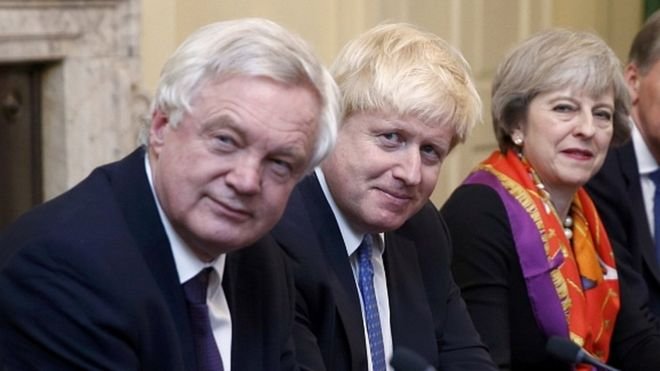Boris Johnson has resigned as Foreign Secretary amid a growing political crisis over the UK's Brexit strategy.
He is the second senior cabinet minister to quit within hours following Brexit Secretary David Davis's exit.
His departure came shortly before Theresa May began addressing Parliament about her new Brexit plan, which has angered many Conservative MPs.
She said she did not agree with the two ex-ministers about "the best way to honour" the result of the 2016 vote.
The BBC's political editor Laura Kuenssberg said Mr Johnson's exit had turned an "embarrassing and difficult situation for the PM into potentially a full-blown crisis".
She said he was not any ordinary cabinet minister but was the "face" of the Leave campaign during the 2016 referendum and his departure would fuel speculation about a leadership challenge.
She said she had been told by a source that either Theresa May "dumps" the plan signed off at Chequers or "another minister will go, then another, then another, then another".
Live updates: May statement as Brexit crisis grows
Kuenssberg: Davis lifts lid on tensions
Raab replaces Davis as Brexit secretary
Brexit Secretary David Davis resigns
The UK is due to leave the European Union on 29 March 2019, but the two sides have yet to agree how trade will work between the UK and the EU afterwards.
There have been differences within the Conservatives over how far the UK should prioritise the economy by compromising on issues such as leaving the remit of the European Court of Justice and ending free movement of people.
Theresa May only has a majority in Parliament with the support in key votes of the 10 MPs from Northern Ireland's Democratic Unionist Party, so any split raises questions about whether her plan could survive a Commons vote - and has also led to renewed questions about whether she will face a challenge to her position.
Speaking in a boisterous House of Commons, Mrs May paid tribute to Mr Johnson's "passion" in championing a global Britain after Brexit and Mr Davis' work in steering through key Brexit legislation.
But she told MPs: "We do not agree on the best way to deliver our shared commitments to honour the result of the referendum."
Mrs May told MPs that the plan agreed by the cabinet at Chequers was the basis of a "responsible and credible" offer to restart renegotiations with the EU.
But she warned that if the EU did not engage with her plan, there was a "serious risk" of the UK leaving in March 2019 without a deal in a "disorderly" manner.
Media captionDavid Davis explains why he resigned
Labour said Mr Johnson's exit - on top of Mr Davis's departure - left Theresa May with "zero authority".
Former Tory chairman Grant Shapps, who last year called on Mrs May to consider her position, said it was the wrong time for a leadership contest and he hoped it would not happen.
He told the BBC a contest would take three months and "we physically do not have the time for that" given the UK is due to leave the EU next March and both sides want a Brexit deal by October.
Mr Johnson, who has been foreign secretary since June 2016, had been due to attend a summit on the future of the Western Balkans in London but did not show up - fuelling rumours about his imminent departure.
Labour's deputy leader Tom Watson said the government was "in meltdown".
"This is complete and utter chaos," he said. "The country is at a standstill with a divided and shambolic government. The prime minister can't deliver Brexit and has zero authority left."
But Mr Johnson's move was welcomed by former UKIP leader Nigel Farage, who said the ex-mayor of London had the chance to "save Brexit".